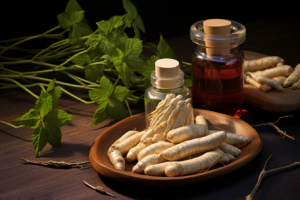What is Ginseng?
Ginseng is an herb that has been used for thousands of years to boost the immune system and enhance overall health. It is believed to have a positive effect on the body, and is often taken as a supplement or extract. Korean ginseng, also known as Panax ginseng c.a. Meyer, is the most popular form of ginseng and is widely used in traditional Chinese medicine. Studies suggest that ginseng may boost immunity by increasing the production of immune cells and antibodies, as well as modulating the secretion of proteins and polysaccharides.
Ginseng has been shown to have a variety of health benefits, including boosting energy, reducing fatigue, and providing resistance to illness or microbial attacks. In one study, healthy adults who took ginseng extract for 8 weeks had a significantly improved survival rate against influenza compared to the placebo group. Other studies have found that ginseng could have a neuroprotective effect, improve exercise performance, and even reduce the severity of chronic fatigue syndrome. While the effects of ginseng are still being studied, it is believed that the ginsenosides and other compounds found in ginseng root are responsible for its potent immune-boosting properties.
Benefits of Ginseng for Immune Support
Ginseng has been used for centuries as a natural remedy for a variety of ailments, and its benefits for immune support are no exception. Studies have found that extracts of Panax ginseng, Korean red ginseng, and Siberian ginseng have been shown to enhance immune function and protect against infectious disease. The active components of ginseng, ginsenosides and polysaccharides, are believed to be responsible for its immunomodulatory effects. These substances have been found to boost the body’s first line of defense against microbial attacks through the regulation of antigen-presenting cells, cytokines, and immunoglobulins.

In addition, ginseng has been extensively reported to have antiviral activity, and a recent study found that people who took a capsule of ginseng extract (G115) had a milder case of the flu than those who did not.
Furthermore, the study found that the ginseng extract was more efficacious than a placebo pill.
Other studies have also found that ginseng supplementation can be an effective remedy for fungal and viral infections, as well as inflammation of the central nervous system. In addition, ginseng has been found to synergistically enhance the body’s immune response to insulin and other antigens, making it an effective booster for the digestive and mucosal systems.
How to Boost Your Immune System with Ginseng
I’m always looking for ways to stay healthy and boost my immune system, so when I heard about ginseng, I was all ears! Ginseng is an herbal remedy that has been used for centuries to help ward off illness and disease. It’s packed with ginsenosides, which are compounds that have been shown to have antiviral and anti-fungal properties. Studies have shown that ginseng can help boost the immune system by increasing the production of immunoglobulin A (IgA), a marker of immune system health. Plus, it can help reduce the harm caused by viruses, bacteria, and other pathogens.
Human studies have also shown that ginseng can be effective in boosting the immune system. In one study, researchers found that taking ginseng for a short-term period increased the efficacy of the immune system, e.g. by increasing the levels of serum immunoglobulin G (IgG) and immunoglobulin M (IgM). So, if you’re looking for a way to boost your immune system, ginseng could be the answer! It’s a natural remedy with no known side effects, so why not give it a try? Who knows, it might just be the key to keeping you healthy and virus-free!
Effects of Ginseng on Optimal Immune System Function
I’m always looking for ways to boost my immune system, so when I heard about the potential effects of ginseng on optimal immune system function, I was all ears! I’ve heard that ginseng can be a powerful md, and that it can help to boost the immune system. According to a human study, ginseng contains ginsenosides, which are believed to have anti-fungal and anti-inflammatory properties. Wow, that’s pretty impressive!
I’m definitely interested in learning more about the potential potency of ginseng. I’ve read that et al, ginseng can help to reduce the risk of hj and other illnesses. I’m excited to see what other benefits ginseng can offer. I’m sure that with further research, we’ll learn even more about the potential effects of ginseng on optimal immune system function.
How to Boost Energy with Ginseng to Support Immune System
Ginseng is a powerful herb that can give your energy levels a real boost. It’s packed with ginsenosides, which are compounds that can help support your immune system. Plus, it’s been used for centuries to help fight off fatigue and boost energy levels. So, if you’re feeling a bit sluggish, ginseng could be just the ticket to get you back on your feet.

But, it’s important to note that ginseng can be a bit of a double-edged sword. It can be a great way to give your energy levels a lift, but it can also be dangerous if you take too much. So, it’s important to talk to your doctor before taking ginseng to make sure it’s right for you.
And, if you do decide to take it, make sure to look for a product that’s free of fungus and other contaminants.
That way, you can be sure you’re getting the most out of your ginseng boost.
Conclusion
[antioxidant] [immune system]Ginsenoside is a type of antioxidant found in the root of the ginseng plant. It has been used for centuries in traditional Chinese medicine to treat a variety of ailments. Recent studies have shown that ginsenoside has a number of beneficial effects on the body, including boosting the immune system. It has been found to have anti-inflammatory, anti-cancer, and anti-viral properties. It also has the ability to reduce oxidative stress and improve overall health. Ginsenoside has been shown to be effective in treating a variety of conditions, including fatigue, stress, and depression. It can also help to improve cognitive function and reduce the risk of certain diseases. In addition, ginsenoside has been found to have a positive effect on the immune system, helping to protect the body from infection and disease. Overall, ginsenoside is a powerful antioxidant that can help to improve overall health and protect the body from disease.

FAQ’s:
Q1. What are the benefits of ginseng for immune support?
A1. Ginseng has been found to have immune-supportive benefits due to its active compounds, such as ginsenosides, which can help to boost the body’s natural defenses.
Q2. What is ginsenoside and how does it help with immune support?
A2. Ginsenoside is an active compound found in ginseng that has been found to have immune-supportive benefits. It helps to boost the body’s natural defenses and can help to protect against infection and disease.
Q3. How much ginseng should I take for immune support?
A3. The amount of ginseng you should take for immune support will depend on your individual needs. It is best to consult with your healthcare provider to determine the best dosage for you.
Q4. Is ginseng safe to take for immune support?
A4. Yes, ginseng is generally considered safe to take for immune support when taken in the recommended dosage. However, it is always best to consult with your healthcare provider before taking any supplement.
Q5. What are the side effects of taking ginseng for immune support?
A5. The most common side effects of taking ginseng for immune support are mild and include headaches, nausea, and dizziness. If you experience any of these side effects, it is best to stop taking the supplement and consult with your healthcare provider.
Q6. Does ginseng interact with any medications?
A6. Yes, ginseng can interact with certain medications, so it is important to consult with your healthcare provider before taking any supplement.
Q7. Is ginseng effective for immune support?
A7. Yes, ginseng has been found to have immune-supportive benefits due to its active compounds, such as ginsenosides, which can help to boost the body’s natural defenses.



 Ginseng For Cognitive Function
Ginseng For Cognitive Function
